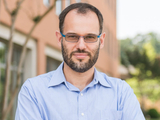Dr. Deffner receives FQXi support to define laws of universe
This story was written by Sarah Hansen and first appeared on news.umbc.edu
Sebastian Deffner plans to spend his career expanding on the work of physics giants to refine our understanding of the fundamental laws of nature, from the inner workings of the tiniest cells to the dynamics of the largest cosmic phenomena. Deffner, an assistant professor of physics at UMBC, recently moved forward in this work through a pioneering paper in Physical Review X with CalTech collaborator Anthony Bartolotta, and now has a new grant to push the envelope even further.
As their paper describes, Deffner and Bartolotta have developed more accurate ways to determine how energy is used, released, and transformed in very small systems with very high energy, which had previously been poorly understood. Deffner’s new grant from the Foundational Questions Institute (FQXi) will enable him to further develop a new field of physics that focuses on energy and information processing.
The origin of intelligence
The FQXi sought research projects that would address the question of agency in the physical world. It’s common to think about actions as being caused by some external force—flipping a switch, pushing a lever—but those levers and switches “are all part of the same universe,” Deffner explains. “We don’t have any scientific idea that there could be something acting on the universe from the outside, which means that anything that happens within the universe actually arises from interaction of different parts of the universe. Nothing comes for free.”
“Now, if this is true, how does something like intelligence or agency actually arise from the very fundamental laws of physics that describe the universe?” he asks. To address that question, Deffner has turned to a new field of physics known as the thermodynamics of information. Classic thermodynamics considers how energy in the forms of heat and work is transformed in physical systems. But Deffner thinks there’s more to it.
Including information
“We don’t get a complete thermodynamic picture if we neglect information. If we only think about heat and work, we will always end up with statements that seem to violate the axioms of thermodynamics,” Deffner says. “Only if we include information processing, and understand what that actually means, do we get a complete thermodynamic picture.”
The idea is that writing and erasing information in a system involves energy, so evaluations of the overall energy in a system must consider information processing. Understanding energy and information processing is important for describing the universe, but it’s also important for more practical applications.
Scientists and engineers are working to develop the next generation of information storage, and it may take the form of “quantum memory”—systems that rely on quantum mechanics and the stability of extremely cold groups of atoms (near absolute zero) to store information.
“If you want to build a quantum memory out of these ultra-cold atoms,” Deffner explains, “you have to understand how information actually is written and how you can stabilize the information content of these systems.”
A universe in flux
Current theories, such as thermodynamics, work well when a system is in equilibrium. However, “if you look at the universe, it’s not in thermal equilibrium. It’s not even close,” Deffner says. For example, think of a star like our Sun constantly releasing heat and light through extremely high-energy reactions.
So, “What I want to do is to take stochastic thermodynamics that we’ve developed for small quantum systems and small biological systems, and apply these concepts and notions to cosmology to get a better understanding of the extremes of the universe,” Deffner says. He’ll be charting new territory in the extraordinarily complex math that describes, at a fundamental level, how the world works.
Following the dream
As his career progresses, Deffner hopes to help generate “a better, more concise understanding of the universe,” he says, “but for that we need a lot of bits and pieces, and almost nothing like this has been done yet.”
The Physical Review X paper took the first baby steps toward developing the basis to move forward with this work. Now, Deffner is off and running, but he recognizes the journey will be a marathon, not a sprint.
“We know which direction we’re going now, and we know which steps to take,” he says, “but we will not be able to describe the universe in 2020. If we’re lucky, that’s something for 2050.”
One thing Deffner does know is that he’s committed to the marathon. “If you don’t dream big, what are you going to do?” he asks. “Sometimes you have to take a risk and follow the dream.”
Posted: October 18, 2018, 1:25 PM
